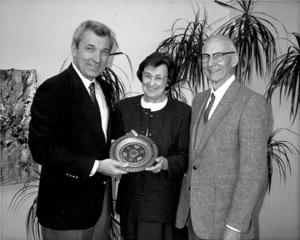The Dekaban Fund
Bridging Two Countries Through Knowledge
The Anatole S. and Pamela D. Dekaban Fund was established in September 1993, with an initial gift from Dr. and Mrs. Dekaban. The purpose of the Dekaban Fund is to encourage and support the exchange of technical knowledge between advanced academic professionals in various fields of engineering at the Warsaw University of Technology and the College of Engineering at the University of Michigan.
The donors chose the University of Michigan because of its reputation in engineering and proximity to a large Polish community in metropolitan Detroit. The major forms of collaboration include visits by Dekaban Fellows and other faculty members, participation in seminars, conferences and workshops, and carrying out research projects. The exchange program is coordinated by the UM College of Engineering along with the Dekaban Fund Advisory Council, and the Dekaban Program Committee at the Warsaw University of Technology.
About Dr. and Mrs. Dekaban
Anatole Dekaban was born in Poland in 1914. He completed his studies at the University of Warsaw Medical School in 1939 and belatedly received his MD in 1944. During the German occupation he was active as a doctor in the anti-Nazi resistance and took part in the Warsaw Uprising of 1944. After the war he began his medical practice in his native city, however, his involvement in the democratic resistance during the war brought him to the attention of the communist authorities. He fled Poland in 1947.
He continued his neurological studies in Canada and received a Ph.D. at McGill University in 1952. He also studied at Columbia University and the Institute of Neurology in London. In London he met and married Pamela Liddle. He held an appointment in neurology at the University of British Columbia from 1952 until 1955. He moved to the National Institute of Health (NIH) at Bethesda Maryland and remained there until his retirement. After his retirement to Whidbey Island, Washington, in 1980 he continued to consult at the University of Washington Medical School and the Children’s Orthopedic Hospital in Seattle.

Dr. Dekaban was the author of two important texts on pediatric neurology and a monograph on the early development of the human brain. He also published over 120 scientific publications in medical journals or as book chapters. He is widely regarded as one of the founders of pediatric neurology. Dr. Dekaban died in the spring of 2001 at age 86.
Pamela Liddle Dekaban was born in London, England, in August 1924. During the Second World War she served in the British Armed Forces. After the war she returned to her education, completing the King George Hospital Training School for Nurses in 1949, having achieved the class gold medal as first in her class. She continued working at St. George’s Hospital after her graduation and there she met her future husband. The couple was married on September 1, 1952. She migrated with her husband to Canada. With her medical background she assisted her husband during his career in the presentation and editing of his publications. She was also a full partner in the philanthropic work that Dr. Dekaban initiated in Poland. Pamela Liddle Dekaban died on May 19, 2003.
Pamela and Anatole Dekaban had two children. Their son, Dr. Gregory Dekaban was born in 1954, and their daughter Joanna was born in 1956. Dr. Gregory Dekaban continues the tradition of medical research at Robarts Research Institute in London, Ontario, Canada.
After his retirement, Dr. Anatole and Mrs. Dekaban started three foundations to facilitate faculty exchanges in the fields of agriculture, economics, and engineering between Polish universities and universities located in the United States, Canada, and the United Kingdom. Named for Dr. Anatole Dekaban and his wife, Pamela Liddle Dekaban, the foundations seek to benefit Poland by enhancing the quality of Polish science and education.
A foundation for cooperative academic exchanges between the faculty of Agricultural Sciences, the University of British Columbia in Vancouver, Canada, and six Polish agricultural universities through the auspices of the main School of Agricultural Economy in Warsaw was established in 1982. The second foundation started by the Dekabans has focused on academic exchange between the Department of Political Economy at University of Glasgow (United Kingdom) and the corresponding faculties of Polish universities. This program was established in 1989, and is managed by the University of Warsaw. A foundation for cooperative academic exchanges between the College of Engineering at the University of Michigan (USA) and the Warsaw Technical University was established in 1993.